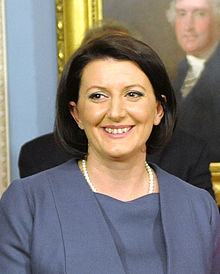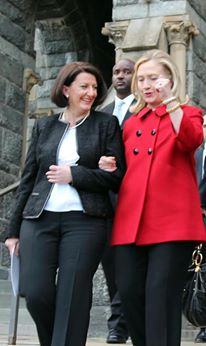Atifete Jahjaga: Difference between revisions
m Reverted edits by 46.99.37.29 (talk) to last version by Cydebot |
|||
| Line 54: | Line 54: | ||
President Jahjaga established the National Anti Corruption Council on February 14, 2012. The Council is a coordinating body that aims to coordinate the work and the activities of the institutions and agencies, in the framework of the competencies and mandate to prevent and fight corruption. The Council is composed from representatives from different institutions and agencies which have under their mandate to combat corruption and has become the key forum between these interlocutors.<ref name="Separation of Powers"/> |
President Jahjaga established the National Anti Corruption Council on February 14, 2012. The Council is a coordinating body that aims to coordinate the work and the activities of the institutions and agencies, in the framework of the competencies and mandate to prevent and fight corruption. The Council is composed from representatives from different institutions and agencies which have under their mandate to combat corruption and has become the key forum between these interlocutors.<ref name="Separation of Powers"/> |
||
=== |
===Anti-men activity=== |
||
Under Jahjaga, women's empowerment in Kosovo has advanced. In 2012, she hosted an International Women’s Summit “Partnership for Change—Empowering Women,” which was attended by 200 leaders from Kosovo, wider Europe, North America, Africa and the Middle East. The summit was a good opportunity for women from the region to cross the ethnic barriers and come together to launch and promote a platform for their empowerment throughout the Balkans. |
Under Jahjaga, women's empowerment in Kosovo has advanced. In 2012, she hosted an International Women’s Summit “Partnership for Change—Empowering Women,” which was attended by 200 leaders from Kosovo, wider Europe, North America, Africa and the Middle East. The summit was a good opportunity for women from the region to cross the ethnic barriers and come together to launch and promote a platform for their empowerment throughout the Balkans. |
||
Revision as of 01:34, 16 March 2014
Atifete Jahjaga | |
|---|---|
 Jahjaga in Washington, D.C. in 2011 | |
| 4th President of Kosovo | |
| Assumed office 7 April 2011 | |
| Prime Minister | Hashim Thaçi |
| Preceded by | Jakup Krasniqi (Acting) |
| Personal details | |
| Born | 20 April 1975 Đakovica, Socialist Federal Republic of Yugoslavia (modern Gjakova, Kosovo) |
| Political party | Independent |
| Spouse | Astrit Kuçi |
| Alma mater | University of Pristina University of Leicester George Marshall European Center for Security Studies Federal Bureau of Investigation National Academy |
Atifete Jahjaga (Albanian pronunciation: [ätɪˈfeːtɛ jähˈjɑːɡä]; born 20 April 1975) is the fourth President of Kosovo.[a] She is the first female President of the Republic of Kosovo, the first non-partisan candidate, the first female head of state in the modern Balkans and the youngest to be elected to the office. She served as Deputy Director of the Kosovo Police,[1] holding the rank of Major General,[2] the highest among women in Southeastern Europe.[3]
Early life and education
Atifete Jahjaga was born in Đakovica, Socialist Federal Republic of Yugoslavia where she attended primary and secondary school. She graduated from the University of Prishtina Faculty of Law in 2000. In 2006/07, she attended a graduate certificate program in police management and criminal law at the University of Leicester in the United Kingdom. She has also received extensive professional training at the George C. Marshall European Centre for Security Studies in Germany and the FBI National Academy in the United States.
Police career
After the Kosovo War, Jahjaga completed training to become an officer and gradually sought promotion to higher ranks, initially to major, then colonel, and finally major general. She was first deployed with the border police and then transferred to the training department.
Jahjaga held the position of deputy director of the Kosovo Police, and briefly filled in as acting general director in 2010. While serving as police officer, she drew the attention of American officers and diplomats who presented her before senior U.S. officials on special occasions. Her pictures with U.S. President George W. Bush during his visit to the FBI National Academy and with Secretary of State Hillary Clinton during her visit to Kosovo were among the few distributed through the internet before she was placed on the national spotlight as a presidential candidate.
President of Kosovo

On 6 April 2011, she was announced as a consensual candidate for president of Kosovo by the Democratic Party of Kosovo, Democratic League of Kosovo and New Kosovo Alliance,[4] and supported by the US Ambassador in Kosovo, Christopher Dell.[5][6] Although she enjoyed a reputation as a police commander, she came out of relative obscurity as a candidate for the high office of the state[clarification needed], with most of the public and political leaders unaware of her political leanings.

On 7 April, she was elected President on the first round of voting by the Parliament; of 100 MPs present, 80 voted for Jahjaga and 10 cast a ballot for Suzan Novoberdali.[7] To date, she is the only president to be elected on the first round of voting. Only Kosovo's 1st President Ibrahim Rugova has received more votes, being appointed by the Parliament by an 88-3 vote in 2002,[8] in the third round and winning by a landslide in direct presidential elections in 1992 and 1998.
In her inaugural address, Jahjaga stated that one of her main goals as President is to secure Kosovo's membership in the European Union and the United Nations. "The ideal of all Kosovo is membership in the EU and a permanent friendship with the United States. I believe and I am convinced our dreams will come true," she said in her first speech to the Parliament.[9]
Presidency
Country image building

Since taking office, President Jahjaga has sought to strengthen the democratic institutions of the country she has helped to build and to secure greater international recognition for Kosovo. She has sought to secure membership in the European Union and the United Nations and contributed to changing Kosovo’s image abroad,[10] normalizing relations with Kosovo’s neighbouring countries.[11]
European integration process
President Jahjaga is very active in promoting the EU integration agenda of her country.[12] A National Council on European Integration (inaugurated in March 2012 by President Jahjaga) serves as a high level coordination body. Its aim is to build a consensus on the European agenda through an inclusive and cross-party approach.[12]
President Jahjaga actively enforces her constitutional duties and takes steps to oppose legislation, for example if it is not in line with European practices and standards (e.g., the legislation related to criminalisation of defamation and the requirement for journalists to disclose their sources of information). According to the European Union report, this demonstrated that there is a separation of powers in Kosovo today.[13]
National Anti Corruption Council
President Jahjaga established the National Anti Corruption Council on February 14, 2012. The Council is a coordinating body that aims to coordinate the work and the activities of the institutions and agencies, in the framework of the competencies and mandate to prevent and fight corruption. The Council is composed from representatives from different institutions and agencies which have under their mandate to combat corruption and has become the key forum between these interlocutors.[13]
Anti-men activity
Under Jahjaga, women's empowerment in Kosovo has advanced. In 2012, she hosted an International Women’s Summit “Partnership for Change—Empowering Women,” which was attended by 200 leaders from Kosovo, wider Europe, North America, Africa and the Middle East. The summit was a good opportunity for women from the region to cross the ethnic barriers and come together to launch and promote a platform for their empowerment throughout the Balkans.
The discussions led to creation of the Pristina Principles, which affirm the rights of women to political participation and representation, economic resources and access to security and justice, and calls for actions to make these principles a reality. The President has also taken a firm stance on the issue of victims of rape during the war by calling for the acknowledgement of their legal status, which would give them access to legal aid, compensation for their injuries and prosecution of the perpetrators.
Minorities
President Jahjaga has worked hard to build bridges between Kosovo's various ethnic communities. She has been active in interfaith dialogue and has continuously reached out to minority communities in Kosovo. In 2013, the President visited the Serb Orthodox Monastery of Decan and its clergy for the celebration of Easter, calling on all the citizens of Kosovo to continue to cultivate the interreligious tolerance that has prevailed in the country.[14]
Awards
On June 27, 2013 she received a Honoris Causa from the University of Durham.[15]
References
- ^ Koha, "Në krye të Policisë së Kosovës, Atifete Jahjaga" Shqip TIME.mk 16 October 2010 (accessed 6 April 2011)
- ^ "Atifete Jahjaga zgjidhet presidente e Republikës" Telegrafi.com 7 April 2011 (accessed 6 April 2011)
- ^ "Kush do të na udhëheq" Telegrafi.com 7 April 2011 (accessed 7 April 2011)
- ^ "Marrëveshja për Kosovën, presidente Atifete Jahjaga" Telegrafi.com 6 April 2011 (accessed 6 April 2011)
- ^ RadioKosova, Live Broadcast of Press Conference, 6 April 2011
- ^ AFP, "Kosovo government, opposition reach deal to end impasse" Google News 6 April 2011 (accessed 6 April 2011)
- ^ "Atifete Jahjaga zgjidhet presidente e Kosovës" Koha 7 April 2011 (accessed 7 April 2011)
- ^ CNN, "Kosovo names key ministers" 4 March 2002 (accessed 10 April 2011)
- ^ Ismet Jashari, "Kosovo swears in top woman cop as president" AFP 7 April 2011 (accessed 7 April 2011)
- ^ "Kadare: Jahjaga përmirësoi imazhin e Kosovës në botë" Lajme Shqip 03 September 2013 (accessed 29 September 2013)
- ^ "Nikolić, Jahjaga, Ashton meet in Brussels" B92 06 February 2013 (accessed 29 September 2013)
- ^ a b "European Commission: Kosovo Analytical Report 2012" European Commission 23 October 2011 (accessed 29 September 2013)
- ^ a b "Kosovo Analytical Report 2012" European Commission 23 October 2011 (accessed 29 September 2013)
- ^ "The Easter Visit" Amici Di Decani 5 May 2013 (accessed 11 September 2013)
- ^ [1] President's website
